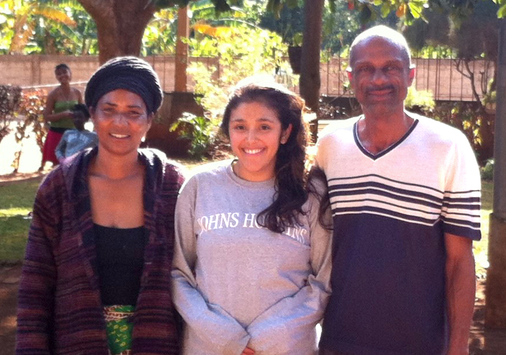Cecil Millen ‘20 was one of only 11 students to present research at the 2020 Human Development Conference at Notre Dame University’s Keogh School of Global Affairs.
Millen was invited to speak as an alumni member of the School for International Training (SIT) study abroad program. Millen, an international studies and Spanish double major at Denison, spent a semester in Chile.
The theme of this year’s Human Development Conference was “Development on the Move” Students were asked to focus on strategies tied to the dynamic nature of some of the most critical issues of the 21st century, including climate change, resource scarcity, and mass migration.
Millen’s presentation was titled “Chile: Cultural Identity, Social Justice, and Community Development; Analyzing the Impacts of Conditions and Strategies Employed by the Mapuche and Zapatista Indigenous Movements on the Global Resistance to Neoliberalism.”
“Once again this year, SIT students have proven their ability to produce exceptional, field-based research at the undergraduate level,” said Dr. Sophia Howlett, president of SIT. “We are immensely proud of these students, as well as the SIT academic and program directors and faculty advisors who helped guide them on their academic paths.”
An abstract of Millen’s paper:
Existing scholarship on post-Cold War indigenous movements tends to focus on the progress of a single movement over time, but few studies have done a comparative analysis of two contemporaneous indigenous movements.
This study examines the variables, (e.g., organization, popular reception/support, solidarity, and confrontational strategies) of each of the Mapuche and Zapatista movements, and the relationships of these variables and characteristics to the successes and failures of indigenous movements more generally.
By analyzing my personal experiences and interviews, neoliberal economic theory, primary sources from within indigenous movements, and scholarly sources about indigenous movements, this investigation reveals that there is no single approach that can “defeat” neoliberalism. In revealing this, my paper argues that neoliberalism can only be resisted, and indigenous movements can only “succeed”, when resistance is comprised of multiple dynamic and multifaceted movements all of which apply pressure, and work toward similar goals, but do so using different methods.
This study’s findings are significant because they inspect both indigenous movements as independent, but necessarily interconnected as they work toward the same goals, but on different geographic planes. This investigation recontextualizes indigenous movements within the broader decentralized anti-globalist movement which can be seen in places like Catalonia, Hong Kong, and now Chile.














